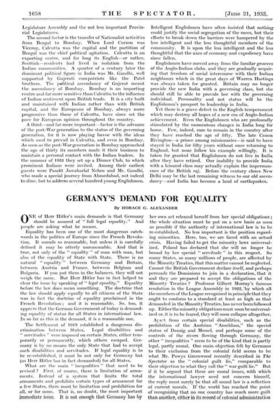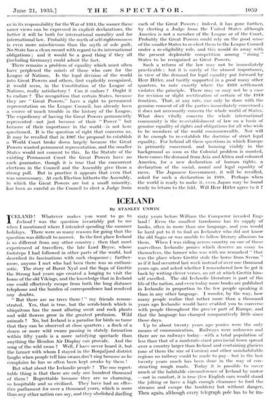GERMANY'S DEMAND FOR EQUALITY
By HORACE G. ALEXANDER ONE of Herr Hitler's main demands is that Germany should be assured of " full legal equality." And people are asking what he means.
Equality has been one of the most dangerous catch- words in the politics of Europe since the French Revolu- tion. It sounds so reasonable, but unless it is carefully defined it may be utterly unreasonable. And that is true, not only of the " equality " of man with man, but also of the equality of State with State. There is no natural " equality " between Germany and Britain, between Austria and France, between Belgium and Bulgaria. If you put them in the balances, they will not weigh the same. But Herr Hitler has in fact helped to clear the issue by speaking of " legal equality." Equality before the law does mean something. The doctrine that the law should apply equally to all citizens of the State was in fact the doctrine of equality proclaimed in the French Revolution ; and it is reasonable. So, too, it apperrs that the German Government of today is demand- ing equality of status for all States in international law. In so far as this is the demand, it is a reasonable one.
The Settlement of 1919 established a dangerous dis- crimination between States. Legal disabilities and " servitudes " were imposed on certain States, either tem- porarily or permanently, which others escaped. Ger- many is by no means the only State that had to accept such disabilities and servitudes. If legal equality is to be re-established, it must be not only for Germany but (as Herr Hitler has in fact demanded) for all States.
What are the main " inequalities " that need to be revised ? First, of course, there is limitation of arma- ments. Instead of a system that limits the total armaments and prohibits certain types of armament for a few States, there must be limitation and prohibition for all, or for none. That is, no doubt, the most important immediate issue. It is not enough that Germany' has by her own act released herself from her special obligations ; the whole situation must be put on a new basis as soon as possible if the authority of international law is to be re-established. No less important is the position regard- ing minorities. Here, too, we are faced with an actual crisis. Having failed to get the minority laws universal= ized, Poland has declared that she will no longer be bound by her special " servitude " in this respect. So many States, so many millions of people, are affected by the Minority Treaties, that this matter cannot be neglected. Cannot the British Government declare itself, and perhaps persuade the Dominions to join in a declaration, that it and they are prepared to accept the obligations of the Minority Treaties ? Professor Gilbert Murray's famous resolution in the League Assembly in 1922,'by which all the members of the League recognized in principle that they ought to conform to a standard at least as high as that demanded in the Minority Treaties, has never been followed up. Either the minority obligations must soon be universal- ized or, it is to be feared, they will soon collapse altogether.
Ar art from certain special disabilities, such as the prohibition of the Austrian " Anschluss," the special status of Danzig and Memel, and perhaps some of the controls of the rivers flowing through Germany, the other " inequalities " seem to be of the kind that is partly legal, partly moral. One main objection felt by Germans to their exclusion from the colonial field seems to be what Mr. Powys Greenwood recently described in The Spectator as the " colonial guilt lie," comparable to their objection to what they call the " war guilt lie." But if it be argued that these are moral issues, with which the international lawyer need not concern himself, the reply must surely be that all sound law is a reflection of current morals. If the world has reached the point of recognizing that no one country has much more guilt
than another, either in its record of colonial administration
or in'its responsibility for the War of 1914, the sooner these saner views can be expressed in explicit deelarations, the better it will be both for international morality and for international law. Probably the myth of self-righteousness is even more mischievous than the myth of sole guilt. No State has a clean record with regard to its international obligations ; and it would be a good thing if they all (including Germany) could admit the fact.
There remains a problem of equality which must often have perplexed the minds of those who care for the League of Nations. Is the legal division of the world into Great Powers and others, first explicitly recognized, it would seem, in the Constitution of the League of Nations, really satisfactory ? Can it endure ? Ought it to endure ? The recognition that certain States, because they are " Great Powers," have a right to permanent representation on the League Council, has already been a source of 'much trouble in the history of the League. The expediency of having the Great Powers permanently represented—not just because of their " Power " but because of their importance in the world—is not here questioned. It is the question of right that concerns us. It may be recalled that in 1907 the proposal to establish a World Court broke down largely because the Great Powers wanted permanent representation, and the smaller States would not consent to this. In the Statute of the existing Permanent Court the Great Powers have no such guarantee, though it is true that the concurrent elections in the Council and the Assembly give them a strong pull. But in practice it appears that even that was unnecessary. At each Election hitherto the Assembly, in which the Great Powers are but a small minority, has been as careful as the Council to elect a Judge from each of the Great Powers ; indeed, it has gone further, by electing a Judge from the United States although America is not a member of the League or of the Court. Probably the Great Powers could rely on the good sense of the smaller States to re-elect them to the League Council under a re-eligibility rule, and this would do away with the present deplorable competition among " rising " States to be recognized as Great Powers.
Such a reform of the law may not be immediately practicable ; but it is surely of the utmost importance, in view of the demand for legal equality put forward by Herr Hitler, and tacitly supported in a good many other quarters, to note exactly where the 1919 settlement violates the principle. There may or may not be a case for revision or slight rectification of certain of the 1919 frontiers. That, at any rate, can only be done with the genuine consent of all the parties immediately concerned ; it does not-necessarily concern the whole world of States. What does vitally concern the whole international community is the re-establishment of law on a basis of genuine equality of rights and obligations for all who wish to be members of the world commonwealth. Nor will it be enough to re-establish the doctrine of strict legal equality. For behind all these questions in which Europe is primarily concerned, and looming visibly in the background as soon as the Colonial problem is mooted, there comes the demand from Asia and Africa and coloured America, for a new declaration of human rights, a declaration of the social, moral and legal equality of races. The Japanese Government, it will be recalled, asked for such a declaration in 1919. Perhaps when the world is ready to make it, even Japan may be found ready to return to the fold. Will Herr Hitler agree to it ?









































 Previous page
Previous page